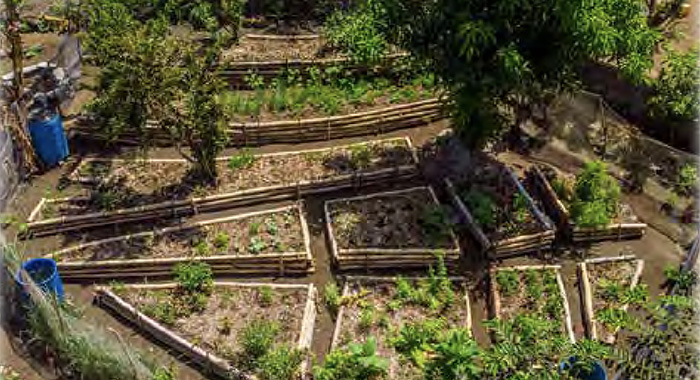Vincentians and other people interested in ecological gardening, such as backyard gardens, now have a new step-by-step handbook to help guide their efforts.
Richmond Vale Academy (RVA) has released an online handbook on the subject, titled, “Guide to Ecological Gardening in St. Vincent and the Grenadines”.
The book, which is in the public domain is free to copy or share in part or in whole, has content from staff and students at RVA who worked together with many small farmers and families in St. Vincent and the Grenadines, creating and developing home gardens.
The printing of the manual is supported by The University of the West Indies and the University of Exeter along with funding from the Global Challenges Research Fund of UK Research and Innovation.
In the manual, the RVA team shares their experience in designing and building hundreds of ecological gardens in SVG.
The manual is intended to be both a theoretical and practical guide on how and why to create sustainable backyard gardens.
The 18 chapters, which are spread over 200 hundred illustrated pages, address topics such as how to choose the best location for your garden, building gardens that nourish the soil food web in order to grow fertile, healthy and abundant soils; the basics of permaculture; components of RVA’s ecological model garden project, site analysis; water harvesting; composting, its importance for ecological farmers and how to prepare it; types of garden beds; and, how to maintain a nutrient-rich, ecologically friendly garden bed.
RVA notes that the food production ecosystem depends largely on synthetically-derived chemicals that have a toxic effect on the human body, such as being cancer-causing.
The handbook further notes that the burning of fossil fuels has been directly attributed to the changing climate, including the rising average temperatures, rising sea level and extreme weather events.
The handbook says that the input-based system relies on chemical or organic inputs, usually imported from distant countries and incurring large carbon footprints.
“These inputs are subject to price and availability fluctuations making any enterprise based on them insecure. When this insecurity relates to food — both its availability and its quality — then it is critical that we, as a nation, secure our food sovereignty.”
“In a world of increasing population and decreasing viable land for food production, we need an alternative approach to agriculture that satisfies three criteria: socially-, ecologically- and environmentally-sustainable,” the handbook says of the “alternative” approach to farming, typically referred to as ecological or regenerative farming.
“The understanding and implementation of the knowledge presented in this manual will help you to become independent of chemical inputs while producing healthy, abundant crops.”
Under its pass-it-on Ecological Home Garden Project, RVA has sought to introduce communities around St. Vincent to the principle that underpin ecological gardening.
The RVA team has designed, recovered and implemented over 200 backyard gardens over the past five years and is on its way to achieving its first target milestone of 300 backyard gardens.
“Besides the possible extra income from home gardens, we should also see home gardens as a pharmacy that improves our lives and the life of nature on which we depend for our existence,” Stina Herberg, director of RVA said.
“We should see it as a bank, in which we invest in the future of the earth and our children… Ecological farming is not just about growing food. It is about raising conscious people who understand the magnificent importance and power of nature,” Project Leader Marvin Douglas further stated, adding that these people can protect the planet and fight for future generations.
“We have created this book to help people across the Caribbean learn how to become more food and water secure in a time of climate crisis. This book is how to achieve that with a learning-by-doing approach,” he further stated, adding that the book is the first of its kind in SVG and will benefit hundreds of small farmers.
The book can be accessed and downloaded here.






